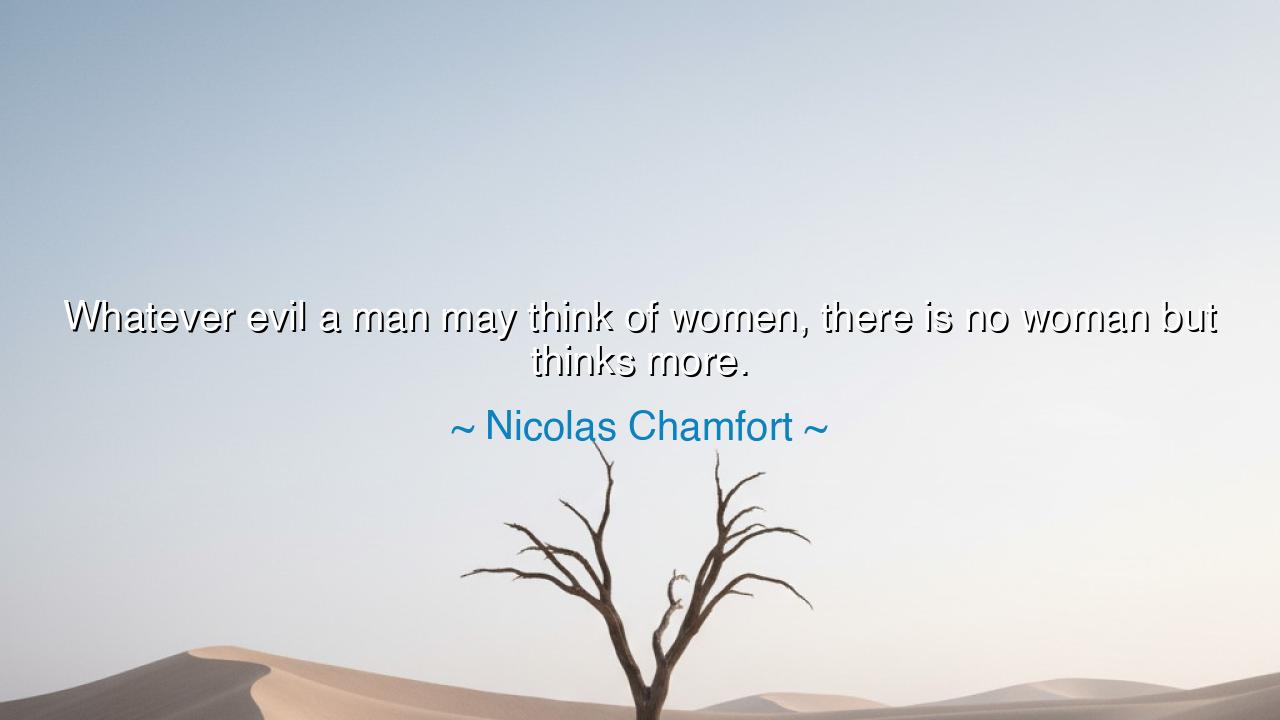
Whatever evil a man may think of women, there is no woman but






The words of Nicolas Chamfort, French wit and philosopher of the Revolution, cut with paradoxical sharpness: “Whatever evil a man may think of women, there is no woman but thinks more.” In this saying, he reveals the deep and often hidden self-awareness of women, who, far from being ignorant of their faults, may see them with even greater clarity than men do. It is not simply a jest at human weakness, but an insight into the nature of self-criticism, which women, shaped by centuries of scrutiny, have cultivated to a painful degree.
The ancients knew this truth in subtler forms. In Athens, women were silenced in the public square yet judged endlessly in the home. Surrounded by criticism, they learned to anticipate and surpass the harsh judgments of men. What men called evil—vanity, cunning, jealousy—were traits women themselves had already examined, exaggerated, and condemned in their own hearts. Chamfort, with a cynical smile, declares that men’s reproaches are almost redundant, for women have already thought worse of themselves.
This saying is also a mirror to society’s injustice. For while men were permitted pride, arrogance, and ambition, women were taught to see even small flaws as immorality. Thus, their inner judgment grew harsher than any outer critique. One might recall Heloise, the brilliant scholar and lover of Abelard, who condemned herself with a ferocity far beyond the scorn of her age. Her letters reveal a soul more severe upon itself than any critic could be—proof of Chamfort’s dark observation.
At another level, his words remind us of the cleverness and resilience of women. For to think worse of oneself than others do is also a shield: no accusation wounds, for it has already been spoken within. Many women of history, from queens to mothers in silence, bore this double vision—judged without, but judging even more within. It gave them endurance, though it often deepened their sorrow.
Let the generations remember: Chamfort’s wit hides both cruelty and truth. It mocks the vanity of men who believe their criticisms wound deeply, when in fact women’s own self-knowledge cuts sharper still. Yet it also calls us to see the burden placed upon women by a world that demanded impossible perfection. Whatever evil a man may think of women, let him know: she has already thought more, and borne the weight of that thought in silence. And perhaps the true wisdom lies not in her self-condemnation, but in freeing her from the need to carry it at all.






PApuong anh
Chamfort’s quote seems to play on the idea that women’s thoughts about men are more intense or critical. But is that necessarily a bad thing? Could it mean that women are more reflective or discerning in their relationships with men, and that they have a sharper sense of observation? Does this imply that men, by comparison, may be too superficial or unaware of the complexities of women’s perspectives?
VNLu Van Nhan
I find this quote to be a bit harsh, but I also think it could be interpreted in a different way. Maybe it’s not about women thinking more evil thoughts, but rather that they are more attuned to the nuances and complexities of human behavior, especially when it comes to relationships with men. Could it be that women, with their unique experiences, have a deeper understanding of men’s flaws and vulnerabilities?
MQLe Dac Minh Quan
Chamfort’s quote seems to imply that women think deeper or are more critical than men when it comes to the opposite sex. But why should women’s thoughts about men be seen as inherently more evil or negative? Could it reflect the historical tension between the sexes, where women have had to be more observant of men’s behavior to navigate a male-dominated society? How much of this perspective comes from the need for survival in a complex social structure?
L-Linh -munu
It’s an interesting take, but it feels a bit cynical. Does it mean women are inherently more critical, or does it suggest that men underestimate women’s perspectives? Perhaps the quote reflects a certain level of disillusionment or frustration from men’s viewpoints. Could it also hint at how women have historically been seen through the lens of male judgment, while women, in turn, analyze men from their own unique experiences?
VLNguyen Van Lam
This quote seems to suggest that women are more aware of the flaws and complexities of men than men are of women. I wonder if that’s true, though—does it imply that women are more judgmental, or just more perceptive? Maybe it’s a reflection of how women are often forced to navigate societal pressures and expectations, which might make them more analytical or critical of the world around them, including men.